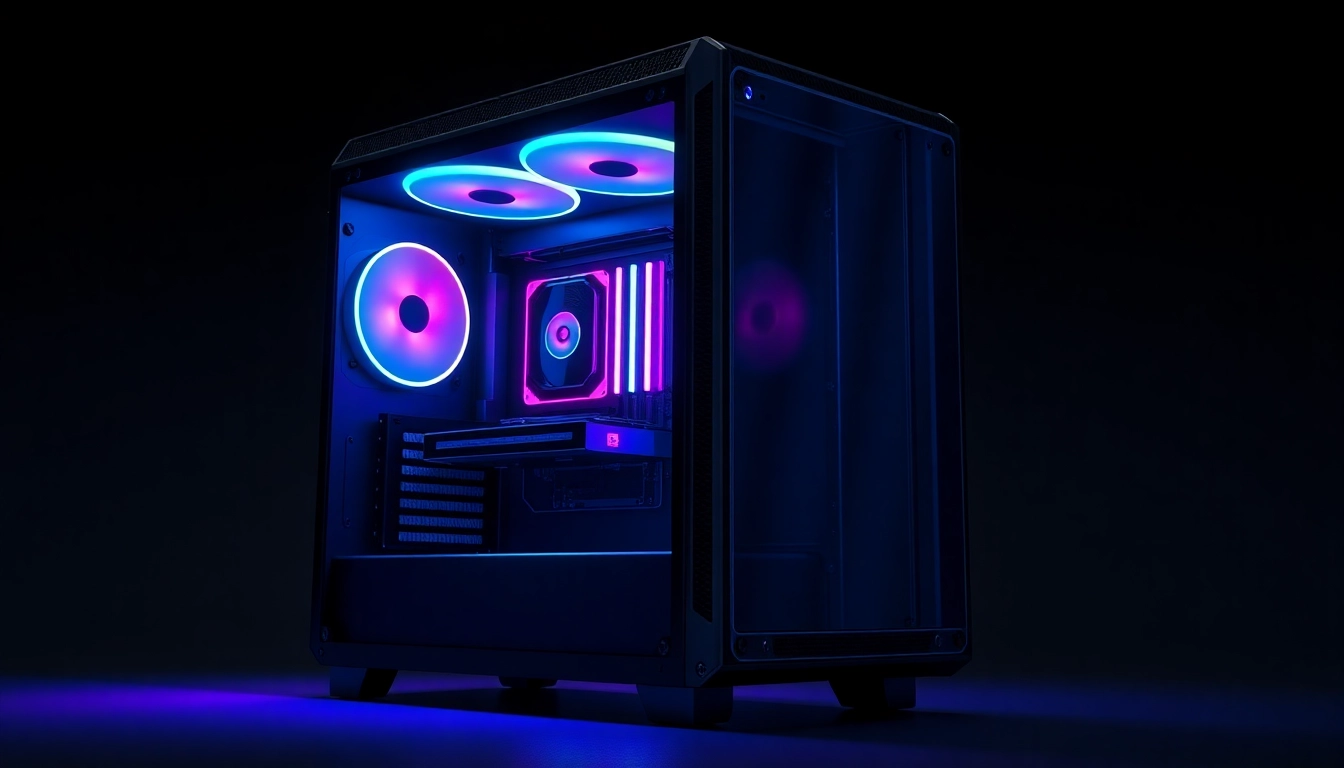1. Understanding the Importance of a Good Gaming PC Case
Choosing the right gaming pc case is pivotal in the realm of PC building. A gaming PC case serves as the foundation of your entire build, impacting not only aesthetics but also functionality, airflow, and thermal management. A well-designed case can make your system run efficiently while showcasing your unique style. Understanding why a quality gaming chassis is crucial can profoundly enhance your gaming experience.
1.1 Why Your Gaming PC Case Matters
The case of your gaming PC is not just a protective shell for your components; it plays several essential roles:
- Protection: The casing protects sensitive components like the GPU, CPU, and motherboard from physical damage, dust, and spills.
- Cooling: A good case promotes proper airflow, essential for keeping your components cool during intense gaming sessions.
- Accessibility: Easy access to internal components for upgrades or maintenance is crucial, particularly as technology evolves rapidly.
- Aesthetics: The design of your case can be a reflection of your personal style, often featuring RGB lighting, tempered glass panels, and customizable elements.
- Compatibility: A quality gaming case is designed with standard sizes and layouts in mind to accommodate various components, minimizing compatibility issues.
1.2 Key Features to Look For in a Gaming PC Case
When selecting a gaming PC case, understanding key features that enhance performance is vital:
- Size: Ensure the case supports your motherboard size (ATX, Micro-ATX, or Mini-ITX) and accommodates all components.
- Cooling Options: Look for cases with multiple fan mounting points, larger airflow pathways, and the capability to install liquid cooling systems.
- Cable Management: Cases with good cable management options enable cleaner builds and improved airflow.
- Drive Bays: Adequate drive bays for SSDs and HDDs allow for future upgrades while maintaining performance.
- Build Quality: Sturdy materials, preferably steel or aluminum, offer durability while lightweight designs aid portability.
1.3 Popular Brands of Gaming PC Cases
Numerous brands stand out in the market for their quality and innovation:
- Corsair: Known for its reliable builds and sleek design, Corsair cases often include RGB and excellent airflow management.
- NZXT: With a focus on aesthetics and user-friendly designs, NZXT has gained popularity among PC builders.
- Thermaltake: This brand specializes in customizable gaming cases, providing options for cooling and aesthetics that can suit any gamer’s needs.
- Lian Li: Renowned for its aluminum construction and elegant designs, Lian Li cases are preferred among enthusiasts wanting premium materials.
- Phanteks: This brand offers excellent performance and cooling capabilities, often at competitive prices.
2. Types of Gaming PC Cases
The gaming PC case landscape is diverse, and each type caters to different user preferences and requirements:
2.1 Mid Tower vs. Full Tower Gaming PC Cases
These two case types offer different advantages and are suited to different user needs:
- Mid Tower Cases: Mid towers are the most common in builds, balancing size and expandability. They typically support standard ATX motherboards and allow for adequate cooling and cable management.
- Full Tower Cases: Full towers provide extensive room for larger components, additional drives, and superior cooling options due to their larger size. They are ideal for high-end setups or those looking to build and upgrade frequently.
2.2 The Rise of Compact Gaming PC Cases
With gaming becoming more mobile and space-conscious, compact cases are gaining popularity:
Compact gaming cases, often in Mini-ITX format, are designed for efficiency and portability. These cases suit users with limited space or those who want a streamlined build without sacrificing performance. However, it’s essential to consider thermal management, as their smaller nature can lead to heating issues if airflow isn’t adequately managed.
2.3 Unique and Custom Gaming PC Cases
Custom and unique cases are often crafted for enthusiasts who want to stand out:
These cases can range from handmade artisan cases to uniquely designed mass-market options that reflect personal preferences. They often feature intricate designs, customizable features, and sometimes incorporate advanced technology, such as LCD display panels, for monitoring performance in real-time.
3. Essential Features of the Best Gaming PC Cases
Identifying essential features can help narrow your options when choosing a gaming PC case:
3.1 Airflow and Cooling Solutions
Efficient airflow is vital to any gaming setup due to the heat generated by high-performance components. Look for:
- Fan Mounting Options: Cases should allow for multiple fan placements, with support for both intake and exhaust fans.
- Radiator Support: Many gamers opt for liquid cooling systems, so ensure your case can accommodate radiators of varying sizes.
- Airtight Design: Cases that minimize dust ingress will help maintain optimal operating conditions over the PC’s lifespan.
3.2 Cable Management and Accessibility
Good cable management not only improves aesthetics but also enhances airflow and accessibility. Key features include:
- Cutouts and Tie Points: Look for cases with strategically placed cutouts and tie points to secure and route cables neatly.
- Accessible Drive Bays: Easily accessible drive bays simplify component upgrades or replacements.
3.3 Aesthetics: RGB Lighting and Design
Aesthetics play a significant role in many gamers’ decisions:
RGB lighting has become a staple in the gaming community, allowing users to customize their setups visually. Many modern cases incorporate tempered glass panels for visibility of the build, allowing the illuminated components to shine. When choosing a case, consider both functional design and how it fits your personal aesthetic preferences.
4. How to Choose the Right Gaming PC Case for Your Build
Selecting the perfect gaming PC case involves several considerations:
4.1 Assessing Compatibility with Your Components
One of the first steps is ensuring that your chosen case is compatible with your components. Here’s how:
- Motherboard Size: Verify that the case supports the specific motherboard size (ATX, Micro-ATX, or Mini-ITX).
- Graphics Card Clearance: Ensure the case can accommodate the length of your graphics card, particularly for high-end models.
- Cooling Systems: If planning to use liquid cooling, check for the compatibility of radiators and fans.
4.2 Budget Considerations for Your Gaming PC Case
Your budget will greatly determine the available options. Consider the following:
- Price Range: Gaming cases can range significantly in price. Setting a budget upfront will help narrow down choices.
- Long-term Investment: While cheaper cases might save money initially, investing in a higher-quality case can provide better performance and durability.
4.3 Reviews and Recommendations of Popular Models
Before making a final decision, consult reviews and comparisons of popular gaming cases. Here are some recommended models to consider:
- Corsair 4000D Airflow: Known for its excellent cooling and cable management features.
- NZXT H510: A modern case with sleek design and reliable construction.
- Thermaltake H700: Provides ample space and customization options.
- Lian Li PC-O11 Dynamic: Popular among builders for its aesthetics and cooling potential.
5. Maintaining Your Gaming PC Case
After building your gaming rig, maintenance is crucial for optimal performance:
5.1 Cleaning and Dust Management Tips
Keeping your case and its components clean is vital to ensure longevity and performance:
- Regular Dusting: Use a soft cloth or an air blower to prevent dust buildup inside the case.
- Filters: Utilize dust filters on fan intakes to minimize dust accumulation significantly.
5.2 Upgrading Components within Your Gaming PC Case
As gaming technology evolves, maintaining flexibility for upgrades is key:
Choose a case that allows for easy access to components, particularly the GPU and CPU, as these are often the first components needing updates. Having enough space for additional drives and cooling systems will also facilitate easier upgrades.
5.3 Monitoring Temperatures and Performance
Finally, monitoring your case’s internal temperatures plays a crucial role in maintaining performance:
Consider integrating temperature sensors or using software tools to keep track of thermal performance, ensuring that your system runs optimally even during the most demanding gaming sessions.



